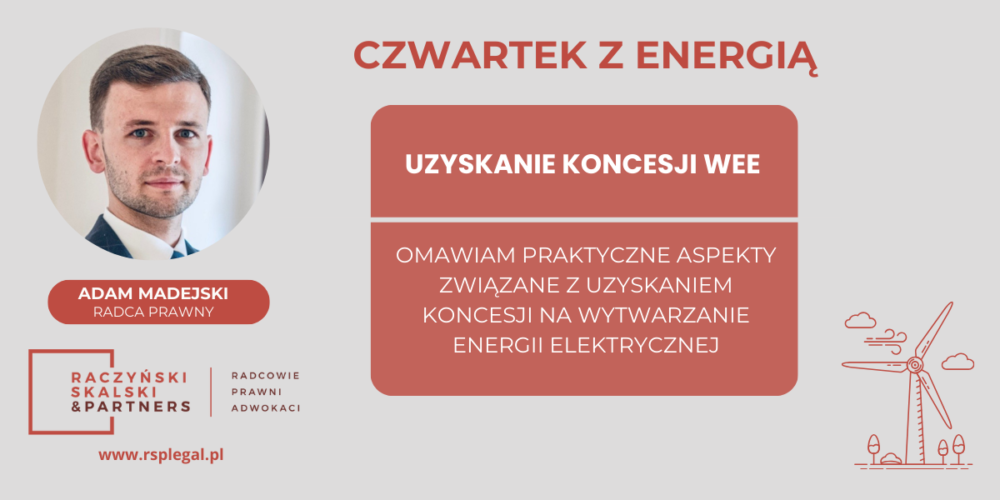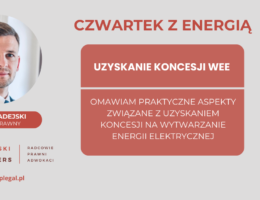More and more entrepreneurs are considering the construction of renewable sources with a capacity of more than 1 MW. Not in every case it will be possible to achieve full self-consumption – it happens that during technical interruptions or days off, electricity consumption drops noticeably. In such cases, it is possible to give the surplus to the grid, which will allow you to get additional funds for your business. However, it should be remembered that in such a situation the generator will have to obtain a license to generate electricity. Although the Energy Law contains a number of information about the conditions for obtaining a license, in practice the list of documents, data and information about the planned investment is much longer.
1.Basic data
The first step in preparing an application for an electricity generation license is to indicate the registration details of the applicant, and in the case of commercial companies – in addition, information about the persons authorized to represent them and who are members of the supervisory board (if any).
Although it does not directly follow from the Energy Law, the holder of a license is obliged to immediately notify the ERO President of any change in registration data – such a requirement is indicated each time in the content of the license, as a component of the content of the decision (Article 37(1)(5) and (7) of the Energy Law).
The main concern of applicants, especially those with foreign capital, is the need to provide certificates of no criminal record for all persons authorized to represent and for members of the supervisory board, in addition to the entity itself. It should be mandatory to provide a certificate from the Polish register and from the registers of the countries where the parent entities are based, as well as the countries of citizenship of the individuals. In the case of companies with foreign capital, there are often situations when it is necessary to obtain certificates from the registers of several countries. It is worth remembering that any document issued in a foreign language should be translated by a sworn translator.
The requirements related to the presentation of comprehensive information on the clean criminal record of individuals and entities stem from the need to ensure that the licensed activity will not be carried out by an entity about whose honesty and reliability there are significant doubts. Pursuant to Article 33(3)(3) and (3a) of the Energy Law, a license may not be issued to an applicant who has been convicted by a final court judgment of an offense or a fiscal offense related to the business activity conducted.
Also important is the regulation of Article 33(3c) of the Energy Law, which requires the ERO President to suspend proceedings for the granting of a license in the event that pre-trial proceedings (with charges) are initiated against the applicant, persons authorized to represent the applicant or members of the supervisory board. The suspension of proceedings lasts until the conclusion of pre-trial or court proceedings, depending on whether an indictment has been filed.
The issue of criminal record is important not only because it is a negative premise for granting a license. This is because it must be remembered that Article 33(3)(3) of the Energy Law speaks explicitly of a conviction for a crime or a fiscal offense that is related to the business, not for any crime. Potential convictions for other crimes may be taken into account by the ERO President when examining the prerequisite of providing guarantees for the proper performance of licensed activities under Article 33(3d) of the Energy Law. However, I would like to point out that in such a case, it will be incumbent on the ERO President to demonstrate that there is a connection between the criminal record and the denial of a license, and that such a basis is objective and reasonable in light of the law and the facts.
2. Financial aspects
One of the most important prerequisites for the granting of an electricity generation license is the availability of financial resources for the proper performance of licensed activities. This premise can be developed on three levels:
- actual or demonstrable disposition of financial resources,
- the obligation of the applicant to provide security,
- submission of a business plan.
The prerequisite of having adequate financial resources or documenting the ability to obtain them follows directly from Article 33(1)(2) of the Energy Law. In the case of a license for electricity generation, each case will be evaluated on a case-by-case basis, as the financial status of applicants can vary dramatically, despite the same technical parameters of the generation facility. The documents that are submitted with the application include.
- a statement of annual projected revenues and expenses, projected balance sheet and income statement and cash flow statement, liquidity plans – for the activity covered by the license application, for a minimum of three full calendar years;
- financial statements for the last three years;
- a statement of planned sales of electricity in units of energy (MWh) for a minimum of three full calendar years.
It is worth remembering that the President of the ERO has the right to verify the facts stated in the application for a license in order to determine whether the entrepreneur meets the conditions for carrying out the business activity covered by the license (Article 35a of the Energy Law). It is also important to note that the financial criterion is relevant and valid for the entire duration of the concession – one of the requirements indicated in the conditions for carrying out the concession is the obligation to “maintain or guarantee the possibility of acquiring funds or assets to satisfy claims of third parties that may arise as a result of improper conduct of the activity covered by the concession or damage to the environment.” As can be seen, therefore, it is not only about potential third-party claims, but also the generator’s liability for damages to the environment at least.
Pursuant to Article 38(1) of the Energy Law, the granting of a license may be made conditional on the applicant’s posting of property security to satisfy third-party claims that may arise as a result of improper performance of the licensed business, including environmental damage. This circumstance applies in particular to new entities and special-purpose companies, which by virtue of their lack of a “history” of conducting regulated activities will be required to provide collateral, regardless of the fact that they have adequate financial resources.
Property collateral shall be established in the amount of no less than 1/12 of the highest annual revenues from the business activity for which the license is to be granted, planned by the applicant for the next 3 calendar years (Article 38(2) of the Energy Law). The minimum duration of the security is 12 months, subject to subsequent renewal. Acceptable forms of collateral are a bank or insurance guarantee (Article 38(6) of the Energy Law). As a rule, the collateral is released upon termination of the licensed business, although it is also possible if the size of the energy company’s equity, as shown in the audited financial statements, exceeds the size of the collateral (Article 38(13) of the Energy Law).
The last layer of the premise of having financial resources is the obligation of the applicant to submit a business plan. In practice, a business plan is a document that is intended to give credence to the fact that the financial resources available to the applicant are sufficient to carry out the commercial activity of generating electricity through an RES installation. The business plan also allows verification of the cost assumptions and revenue projections made by the applicant. This is important because in some cases applicants assume overly optimistic operating conditions in the energy market, so that despite a theoretically good financial situation, it may be necessary to provide collateral or obtain additional funds.
3. Technical facilities
No less important than financial issues is the applicant’s possession of adequate technical facilities to operate the RES installation. In the case of sources with a capacity of more than 1 MW, it will be important to ensure proper management of operations, communication with other grid participants and execution of DSO orders in case of grid disturbance. In addition, the commissioning and operation of the grid will require compliance with a number of detailed requirements set forth in the instructions for the operation and maintenance of the power grid.
For the above reasons, the legislator decided that an entity applying for an electricity generation license must meet two main criteria:
1. demonstration of possession of technical capabilities that guarantee the proper performance of the licensed activity, and this in the form of the following documents:
a) a description of the technical parameters of power generation equipment with an indication of the type of fuel used and the technical condition of the equipment;
b) administrative decisions from the construction stage;
c) documents confirming the proper completion of construction and the start of operation of the installation;
d)documents issued by the distribution system operator indicating the proper connection of the installation to the grid;
e) other documents, decisions and agreements necessary for the proper use of the RES installation.
2. employment of qualified persons – employment should exist at the time of application, otherwise the applicant should declare the provision of employment.
4. Summary
As you can see, applying for a license for electricity generation is a complicated process that requires a lot of time. However, proper preparation of a complete set of documentation allows you to pass the administrative procedure smoothly and obtain a license on time, in accordance with the business assumptions.



